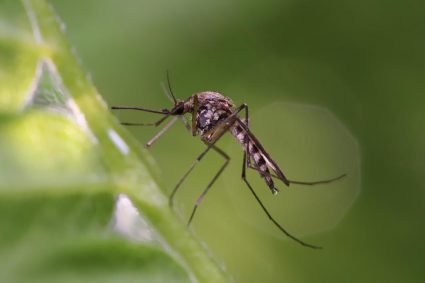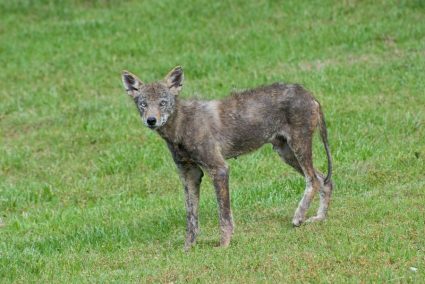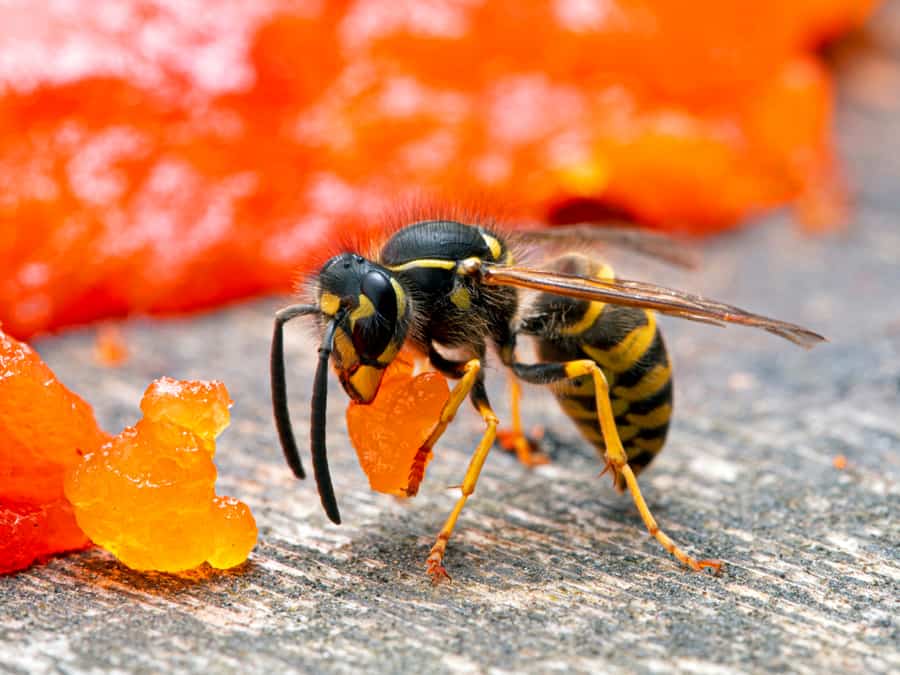
Meat bees are aggressive stingers. Their nests might be difficult to locate. Find out how to keep them away from your surroundings.
This article will help you identify what meat bees are:
- Meat bees are social wasps and quite different from bees.
- They feed on rich-protein sources.
- Their sting causes pain and may trigger allergic reactions.
- You can keep them away by limiting their food source in your environment.
Meat bees are perhaps the most aggressive insects. They build nests close to humans and can harm you. Learn how to spot them and keep them away.
What Are Meat Bees?
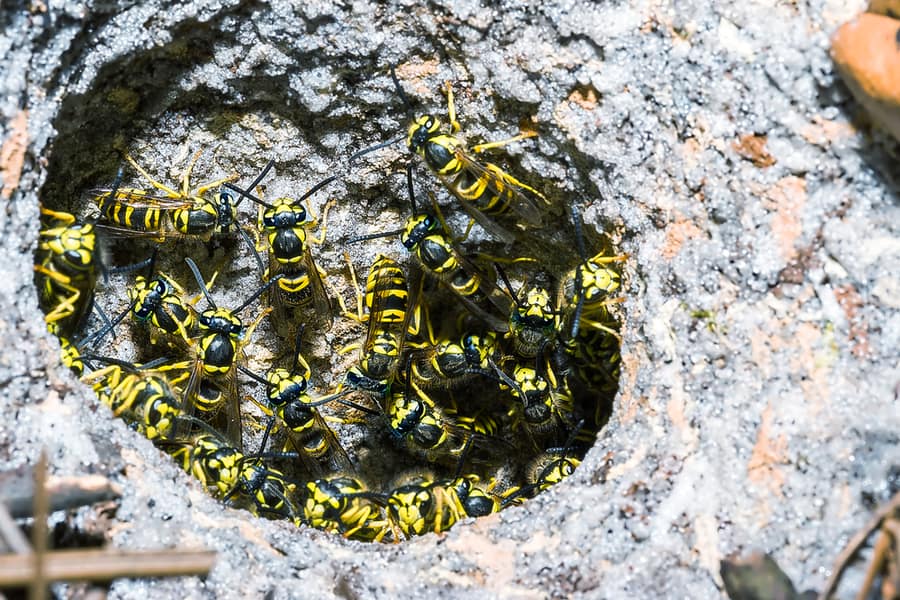
Meat bees are wasps that live together in social groups called colonies. Their nest is mostly found underground, in dense bushes or hollow logs of wood. They were named meat bees due to their striking resemblance to bees and their omnivorous feeding habits. They are known as yellow jackets in North America.
They sting their prey, similar to how bees sting. However, unlike bees, they lack barbs in their stingers, allowing them to sting multiple times. They can also bite.
Hornets can easily be confused for yellow jackets, they are from the same family, the Vespidae family. One of the significant differences is their habitat. While meat bees build their nests underground, hornets live in trees or walls.
What Attracts Meat Bees to My Surroundings?
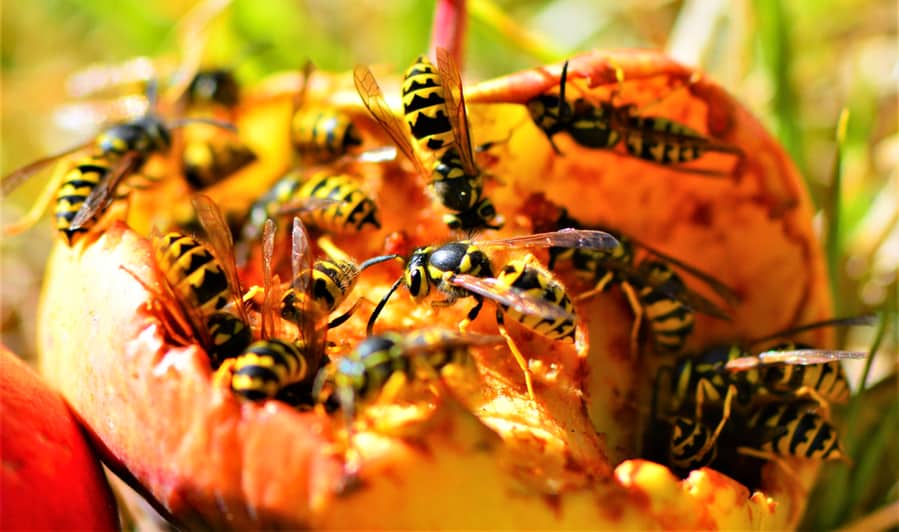
Food attracts yellow jackets to your environment. They feed on other insects, dead or decaying meat, and sweet beverages. Meat bees would be attracted to your yard if it is populated with insects or if your surroundings are littered with refuse of meat and leftover food. Meat bees can help reduce the population of other insect pests because they feed on them.
Meat bees rely on their sense of smell to locate food. They can also be attracted to cologne and perfume oils.
Health Implications of a Meat Bee Sting

Yellow jackets would sting when disturbed by human activities. Their sting can be especially dangerous and even life-threatening to individuals with allergies to their venom. They also release pheromones that would invite other yellow jackets to join in stinging their prey.
A sting from meat bees causes pain and swelling. In addition, some persons may experience several allergic reactions, such as difficulty breathing, nausea, vomiting, sweating, and hives.
Though hypersensitivity reactions can be asymptomatic in some people. This implies that they would not experience any abnormal signs until after a second sting on a subsequent occasion.
The following are just first-aid treatments and should not replace professional care in a medical facility:
- Remove the stinger from the affected area by scrapping gently with your fingertips.
- Wash the affected area thoroughly with soap and clean water.
- Place cold packs or ice on the affected area to reduce pain and swelling.
- Use an antihistamine if you have one.
- Contact emergency medical services.
Learn more on how to manage stings from bugs.
How To Get Rid of Meat Bees

Below are ways to get rid of meat bees:
- You can purchase a fake (decoy) wasp nest and place it conspicuously outside your home. Wasps are territorial, and they would avoid such areas.
- Commercial traps can be used to attract and kill the queens before the breeding season.
- A homemade meat bee trap can be made. You can do this by making a small opening along the top of a soda bottle, inverting it, and filling it up with soda or any sugary drink. This preparation would attract meat bees. They would eventually get in and drown while feeding on the bait.
- Peppermint oil repels meat bees, so you might consider applying them in your surroundings. Click here to read about how to use peppermint oil.
- The use of an electric bug zapper is also recommended. Electric bug zappers are designed to trap and kill insects attracted to light. This device has a light source that attracts insects. When the bugs enter the trap, they will be electrocuted by two wires conducting high-voltage electricity
- Store garbage in tightly sealed containers. Meat bees migrate in search of protein-rich food. If they cannot find any for a long time, they will likely leave for a more suitable location.
- Regularly apply insecticide outside the home to keep other insects away, as they would serve as food for meat bees.
- Discard stagnant waters, as they may serve as breeding points for these bugs.
- Do not go to their nests to destroy them, as it is quite dangerous. They might attack you. Employ the services of a professional pest exterminator to do this.
Conclusion
Meat bees are wasps that live together in colonies as social insects. They feed on other insects and leftover flesh.
Their sting causes pain and can elicit severe allergic reactions, first-aid treatment should be provided to sting victims. You can keep them away by getting rid of substances that attract them, such as dense populations of insects in your environment, leftover meat, and aromatic perfume oils. It is safer to employ the services of a pest exterminator to destroy their nests in your environment.
Frequently Asked Questions
What Season of the Year Favors Meat Bees?
They breed during spring. Winter conditions can destroy their nests. Usually, only the queen survives winter.
Are Meat Bees Diurnal?
Yes, they are active during the day. They usually gather food during the day and are less active at night. At night, you are less likely to be attacked by these bugs.
Do Meat Bees Produce Honey?
No, they don’t. They are not bees but wasps.
What Do Meat Bees Eat?
Primarily, they feed on other insects. They can also act as scavengers consuming dead or decaying flesh.
How Do You Treat Meat Bee Stings?
First-aid treatment should be administered. This involves washing the affected area, placing ice or cold packs to prevent swelling, and taking antihistamines. Then, report to the hospital for professional care.
Do Meat Bees Pollinate?
They are not pollinators but can accidentally transfer pollen grains when moving between flowering plants.







